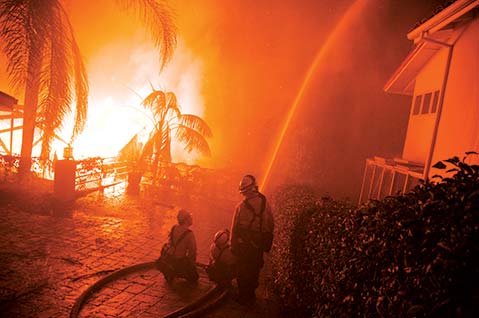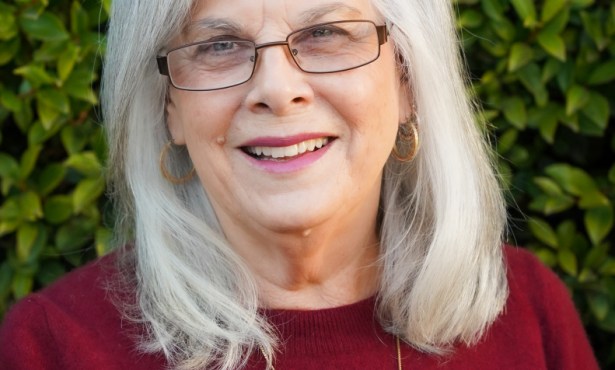House Hunter: Surviving the Wildfire Zone

Barbara Nelson’s mother likes to say that some people are delicate porcelain cups and others are sturdy mugs, the kind you can really knock around. It turns out Barbara and her husband, Andy, can take some serious knocks.
Their buffeting began on June 27, 1990, with the Painted Cave Fire. They were lucky that time. “The fire came over the ridge,” Barbara said in an interview. “It was going to take us out, but then the wind shifted.” The blaze, which destroyed nearly 500 homes, spared theirs on Painted Cave Road. A neighbor, the singer Joe Cocker, was nearly as fortunate, losing only a shed. (Tidbit: Cocker, who was in Europe at the time, was informed of the fire by phone. Apparently one of his thoughts was about the pigs that Jane Fonda had given him as a wedding gift. Told that the flames were approaching, he shouted, “Release the pigs!” Said Nelson, “It’s good to take a little humor from tragedy.”)
In April 2007, the Nelsons were tested in a different kind of fire, one that caused extensive smoke damage to their downtown State Street shops, Beads and Blue Lotus next door, the boutique where their jewelry creations are sold. That put them out of business for a year, which they spent “cleaning smoke damage off thousands and thousands of our products.”
Seven months after reopening, they were just catching their breath when the Tea Fire roared through Montecito and eastern Santa Barbara. The Nelsons, who had moved to Coyote Road in 1995, weren’t spared this time.
Andy was home that day. He grabbed his computer, his guitar, and the dog; chased the cat for 20 minutes but couldn’t catch it; and escaped. Their house was destroyed.
The personal stories sparked by such a massive disaster could fill books. A real estate column can only scratch the surface, but here’s one scratch. It involves the Nelsons’ daughter, Raquel, who became “the patron saint of cats” in the fire’s aftermath, sneaking through barricades to rescue lost pets. She had just about given up hope of finding her own, a fuzzy, peach-colored Himalayan-tabby blend named Peach, when she took a closer look at one scorched creature she’d already saved and said, “Oh, God, this is my cat!”
Peach made it; the care center (now VCA Care Specialty and Emergency Animal Hospital) saved her. “And they did it all free of charge,” Andy said. “We love them.”
Because their house was in a fire-prone area, the Nelsons were insured through the California Fair Plan, “which is literally called the insurance of last resort,” Barbara said. Some neighbors with better coverage “had to fight tooth and nail,” but the risk pool “was very fair. They paid us the money so we could rebuild.”
That payment was $400,000 less than the house was worth at the time, but it reflected the maximum limit. And since the fire inconveniently coincided with the Great Recession, “banks were squeamish,” Nelson said. “It was a really, really rough time. It took twice as long as we thought it would.” But it worked out, and eventually, four years later, the Nelsons were back into their home, this time built of fireproof steel and concrete. “Awesome,” Nelson labeled it. “Our contractor said, ‘If there’s an earthquake, I’m coming to your house.’ I hope we never test it.”
It was “a doozy of a year, that year,” Nelson said, referring to the one-two punch of the shop fire and the Tea Fire. “I suppose we should have been pessimistic, but we just rolled with the punches.”
That’s not to say those punches didn’t hurt. To have all your everything burned to ashes “sucks, big time,” Nelson said. “Now I see people who have suffered floods or tornados or hurricanes or fires, and my heart just hurts.”
On the other hand, they have a new appreciation for their hometown. First of all, planes did night water drops during the Tea Fire. “They normally don’t, because it’s dangerous for the pilots,” Nelson said. “But they saved a lot of the city. They stopped it before it went lower than the Riviera. That was courageous.”
Yes, there was a lot of bureaucratic red tape to slice through, but other than that the experience was heartening. “People were so compassionate,” Nelson said. “Every day they’d leave notes on our door. ‘Is there anything we can do? Do you need anything?’ It was pretty phenomenal to see what an amazing community we have.”



